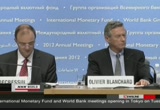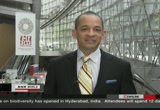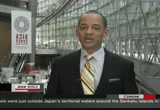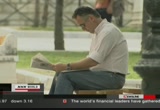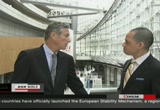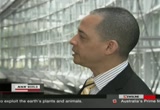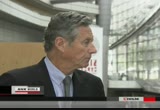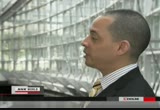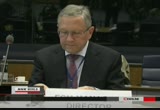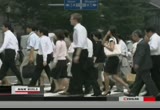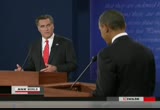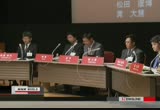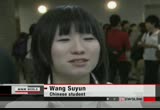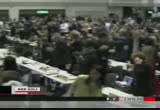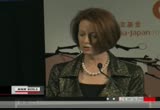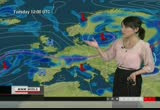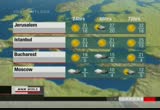tv Newsline WHUT October 9, 2012 7:30am-8:00am EDT
7:30 am
welcome back to "newsline." i'm yuko aotani in tokyo. people around the world are opening up the financial pages ors watching the news on tv and starting to see glimmers of stability. a drop in the unemployment rate in the united states encouraging manufacturing numbers from there and china and growth in emerging markets. but many have read too many stories the past few years to get too excited about the global economy. some of the world's leading economic minds have gathered at
7:31 am
the tokyo international tor forum for the annual meeting of the international monetary fund and world bank. nhk's ron madison is there and will be there all week. i was hoping you could break this down for us. what's going on there? >> reporter: there's lots going on. already been a very full morning. lots of people here. we have finance ministers, central bank governors and other officials from 188 member nations all here now to really, you know, try to agree on how to deal with the problems that they share. and as you point out, they do have quite a few of them. of course, we've got the debt crisis in europe. but also another factor is the slowing growth in china. also, political problems on the horizon in the united states as well as other places. now, the economists from the imf have answered some of our questions with their world economic outlook. we'll have the details of that coming up in just a few minutes. now, also finance ministers and central bankers from the group of 7 nations will be meeting to discuss the challenges that they share. organizers have scheduled somewhere around 200 seminars as well as other events to discuss
7:32 am
finance, poverty, as well as a whole host of other challenges. we've got even an example from right here in japan. many of the people attending will be heading up to northeastern japan to see the reconstruction efforts from the earthquake and tsunami last year. >> right. so help us through this. the international monetary fund, world bank, what roles do each of these institutions play? >> reporter: that's right. lots of people are really confused about the difference really from the beginning of this. even the founding father of the institutions admitted he was a bit confused. he thought the fund should be called a bank and the bank should be called a fund. really does make sense. both of them came out of the conference in new hampshire near the end of world war ii. the international monetary fund's main role, though, is to extend financial support to countries in crisis. one example, it recently provided loans to greece as the greeks there deal with their debt problems. imf economists analyze preva prevailing trends to really try to prevent economic crises like
7:33 am
the ones we've seen in europe. they like to say the imf is an enemy of surprise. in terms of the world bank, that's primarily an institution focused on development. poor country's efforts to pursue economic growth. one example, japan received world bank loans right after the war for reconstruction. we've had infrastructure projects like the shinkansen bullet train to propel this country into a period of high growth. >> all right, ron, now that we are up to speed, tell us what's happening there today. >> reporter: imf economists wasting little time today, yuko. they laid out their world economic outlook straightaway and the outlook not that bright. they've actually lowered their growth forecast slightly to 3 % 3.3%. >> the world economic recovery continues but it has weakened further. in advanced economies, growth is
7:34 am
now too low to make a substantial dent in unemployment. >> reporter: now, blanchard said budget restructuring and a weak banking system are all pulling down growth in many advanced nations. he said eurozone countries were susceptible to strong shocks. he's projecting the region's economy will shrink by 0.4%. he said that they're really concerned now about large emerging economies, too. china's projected growth was down 0.2 percentage points from the outlook three months ago. india, meantime, down one point, three points. the forecast saying japan and the united states should actually see growth of 2.2%. imf analysts predict growth globally will gain pace next year up to 3.6%. they warn europe's debt problems will, indeed, remain a threat. now, blanchard said the lessons of the last few years are now clear. i had a chance to speak with him about some of those lessons and also about what financial
7:35 am
leaders still have to learn. all right. so it does seem like this recovery is losing a little bit of steam. take us there where we stand in terms of the global recovery. >> okay. the first thing to say, this is still a recovery. right? we have numbers from the world growth, you know, of 3.5%. that's a recovery. but it's clear it has weakened since last time we had forecast which was three months ago. so that's a bit worrisome. just a bit. the reason is probably an increase in uncertainty. one is decrease in uncertainty about what policymakers are going to do in a few crucial parts of the world. and i think that explains a slowdown. >> okay. now one thing that you do say is that accommodative policy seems to be underpinning the growth we have seeing right now. in fact, we are seeing what's almost been a concerted effort between the european central bank, the u.s. fed, as well as the bank of japan. have they done enough or would
7:36 am
you like to see more? >> they have done a whole lot. surely much more than one might have expected at the beginning of the crisis. they have gotten -- the rates directly controlled more or less to zero. they have intervened some markets. they have taken an aggressive stance. there are more things to do, yes. the margin, qe 3 in the u.s. is probably useful. the scheme in the uk called funding for lending. these are useful schemes. they don't quite do the same as policy in normal times. but they work. and anything we have we should use. >> reporter: okay. what about europe? we did get news today that european stability mechanism was launched. do you think it can be fully mobilized in a timely manner to really help mitigate what's going on in europe right now? >> i think the very good news is the europeans have understood they can't do it bit by bit. they have to have an architecture which makes sen for the eurozone. large controls have been defined. in context, the fact dsm is
7:37 am
coming online is a very important step. now, i think the thing we are worried about is implementation of these fairly general promises. if implemented, i think we can be reasonably optimistic things will turn around. >> how confident are you it will be implemented in time? >> well, we've learned it doesn't happen at once. that sometime good news and then bad news then some progress. i think we may have to be ready for more. eventually, i'm optimistic because there's no alternative and there's just no other way. >> reporter: okay. now, one thing that i have heard you say is that you don't really expect to see recovery until about 2018 which would basically result in a lost decade. what do you see the global economy looking like on the other side of that recovery? will we have a new normal so to speak? >> first, the recovery is taking space. it's not 2018. the question is, when do we get to something like where we would have been absent the crisis? which is a more ambitious goal? 2018. i don't know if it's 2018 or
7:38 am
2016 or 2020. it's clearly going to take time. all kinds of things which need to be repaired. i thing when we get out of all this, you know, financial system will probably look quite different. you know, there's one lesson from the crisis is be careful with your financial system. so it will be much more regulated. but i guess there will be a major change. >> reporter: all right. there certainly seems to be a lot of wild cards on the global front. we have at least three major election as well as the change of power in china. this could point to a high level of political uncertainty at a very critical juncture. how tenuous really does this make your projections now? >> well, the projections are conditional on some assumptions as to what will happen. so we assume the u.s. will not jump from the fiscal cliff. they'll find some way. we assume what the europeans have promised will be put in place, not overnight. we're realistic. but fairly steady lease. bonds will come down. and in china we assume that what
7:39 am
they need to do to maintain growth around 8%, they'll do. now, if this doesn't happen, could be much worse. >> all right. okay. thanks so much for your time today. good to talk with you. all right, you heard me talking there with mr. blanchard about the european stability mechanism. that's one of the key tools now in the defense against further threats in the region. eurozone finance ministers launched their new rescue fund just as the meetings here got started 3 european stability mechanism is a regional version of the imf. 17 finance ministers in the eurozone gathered in luxembourg for the inaugural board meeting of the fund. their new tool replaces emergency measures that were established for greece and other cash-strapped countries. the european financial stability facility. now, the fund's lending capacity is going to be about $650 billion. member nations will contribute to it in line with the size of their economy. the people who run it will be lending money to governments in need and they'll use it to purchase state bonds and bail
7:40 am
out banks directly. analysts say they do expect one of the first tasks for those managers will be to purchase spanish sovereign bonds. well, imf economists zeroed in on the fiscal health of their host. they said planned increases in the consumption tax will not keep japan out of trouble. the economists released their latest report on the fiscal outlooks for various countries. they're predicting japan's debt will rise to nearly 2 1/2 times gdp in 2013 no. now, lawmakers passed a bill to double the consumption tax rate to 10% by 2015 but the imf report says that's just not enough and calling on leaders to carry out additional large-scale tax hikes along with spending cuts and saying japan really needs to generate at least a quarter of a trillion dollars in revenue over the next ten years. that would add up to more than 5% of gdp. here is an interesting sidenote. chinese bankers had planned to be here but they're going to be
7:41 am
staying away. state-run xinhua news agency says the bankers are protesting against japan's nationalization last month of islands in the east china sea. japan controls the senkaku islands. chinese leaders say the territory belongs to them. representatives of bank of china, china construction bank and agriculture bank of china will all be skipping the meetings. xinhua quoted a chinese commerce ministry official saying the decision is further evidence japan's unilateral action is freezing actions. it is the world's largest bank and other institutions are among the top ten in terms of market value. senior officials from china's finance ministry and central bank are still expected to take part, though. now, the people who lead the imf and world bank had originally named egypt as the host of these meetings. political instability there has prompted them to switch
7:42 am
locations to right here in tokyo. now, this isn't the first time the meetings have taken place in jap japan. quite a while ago, the last time. 1964, in fact. that was also a familiar year for many people. that was the year tokyo hosted the olympics. at the time, the economy was really humming along. we had japanese companies exporting everything from ships to steel. we had our bullet trains humming right along, too, as the first shinkansen sped along the line from toke wryo to osaka. the meetings provided japan with a chance to show how it had rebuilt after world war ii. organizers hope to use these meetings to highlight their reconstruction efforts in northeastern japan. well, world bank and imf officials are discussing all sorts of things, somewhere down there, and they're going to be here all week and so will we. we're going it be back, 2at 8:0 this evening japan time, speaking to one of the hosts of this meeting about their hopes and challenges and have plenty more. so please be sure to stay with
7:43 am
us. >> thank you very much, there, that was nhk world's ron madison an the tokyo international forum. now, mitt romney is taking aim at u.s. president barack obama's foreign policy. the republican presidential candidate said obama's handling of the middle east is increasing the risk of conflict. romney spoke about the situation in iran and syria. he said the region is more dangerous now than when obama took office. he accused the president of employing a strategy of passivity. >> it is our responsibility and the responsibility of the president to use america's greatest power to shape history. not to lead from behind, leaving our destiny at the mercy of events. >> romney also criticized obama for slashing the u.s. defense
7:44 am
budget. he promised to roll back the cuts if elected. and a new u.s. poll subjects a big majority of americans who watched the first presidential debate think romney did a better job than obama. gallup surveyed viewers after last wednesday's debate. the poll indicates 72% of respondents believe romney won. 20% favored obama. gallup says the margin of 52 points is the largest it's ever measured in a post-debate poll. approval ratings for romney rose by five percentage points after the debate. he now ties obama at 47%. analysts say the remaining two presidential debates will likely sway the outcome of the november 6th election. japan and china are locked in an increasingly bitter dispute over the senkaku islands in east china sea. the issue dominated a recent
7:45 am
symposium in tokyo joined by academics and students from both countries. participants looked for ways to ease tensions between the feuding neighbors. emotions are still running high. but nhk world detected an encouraging notice in the debate. the active role played by young people. >> reporter: the symposium was originally supposed to be one of the events marking 40 years of diplomatic relations between china and japan. but the senkaku dispute has cast a long shadow. >> translator: the days of japan/china friendship may be over. >> translator: i think the situation offers an opportunity for students and citizens who've been indifferent to develop an interest in japan/china relations. >> reporter: many who help to organize the forum are young chinese who have come to japan to study.
7:46 am
this 24-year-old came to japan two years ago. she is a graduate student. she has traveled by the angry exchanges in recent months. she was especially upset after seeing some of the anti-japanese protest in china turn violent. she is worried the protests will not only worsen ties with japan but also damage china's image in the world. she posted the message online. >> destruction and looting in the name of patriotism will only be seen as uncivilized to the rest of the world.
7:47 am
>> translator: i was angry. as a fellow chinese, i wanted them to stop. i will post what i think is right on the internet, and i hope many people will see it. >> reporter: she was also shocked by the view many japanese people have of chinese. she blames this on a lack of interest japanese have in their giant neighbor. >> translator: it's not that japanese people don't understand china, they have no desire to learn about china. their image of the country is limited to chinese food, language, and so-called china money. >> reporter: she joined in preparations for the symposium two months ago. she wanted more people both in japan and china to take an interest in each other's country. when the day came, some 400
7:48 am
people turned up to join the discussion. some chinese criticize japan's handling of the senkaku issue. >> translator: it's important to show readiness for dialogue. if japan says no territorial issue exists, that shuts the door to dialogue. >> translator: china should not expand its retaliatory measures into the fields of culture and the economy. >> reporter: what can be done to build more trust between the two countries? the younger generation voiced various ideas in a debate session that followed. >> translator: my parents are grateful to the japanese for being kind to we should read bonds one by one starting with the people around us. >> translator: we are now able
7:49 am
to influence a great number of people with the use of twitter and facebook. each one of us can send out messages and that ability is the hope of a generation. >> reporter: better communication was a common theme. and she says that's an encouraging sign. >> translator: devoting myself to an event like this is my way of showing patriotism. i believe the two countries will come to enjoy friendly relations someday. >> reporter: wanting to be better neighbors will take time. during this difficult phase, young people from japan and china can serve as an important bridge between their countries. nhk world, tokyo. delegates from more than 170 nations have gathered in india
7:50 am
to talk biodiversity. they'll discuss ways to use the earth's plants and animals in sustainable manner. the united nations holds the conference every two years. delegates at the 2010 talks in nagoya agreed on rules for sharing economic benefits from genetic resources. the nagoya protocol included measures to safeguard biodiversity. the delegates set a target of conserving at least 17% of land and 10% of coastal and marine areas by 2020. but many governments have yet to pass laws enforcing the protocol. some developing countries say they can't afford to implement the policies. the participants in india are expected to discuss how to secure funding to meet the targets agreed in nagoya. australian prime minister julia gillard urged japan to sign a free trade agreement with her country as soon as possible. she said no other fta would be more natural or logical.
7:51 am
gillard spoke at a reception in sydney to celebrate the 50th anniversary of the japan/aust rai australia business conference. >> japan is a critically important economic partner for australia and will remain so in the future. but in a dynamic and changing region, it's time to take the next step. it's time to seal the deal on the free trade agreement. >> gillard also referred to regional security issues. she said australia and japan must work together to balance rising asian powers such as china and india. she said she wants to use the g-20 summit and the asia pacific economic cooperation forum to work with japan an security jap asking indonesian government to rethink a plan to ban exports of nickel and other ores. japan imports more than 50% of
7:52 am
its nickel from indonesia. edano met indonesia's coordinating minister for the economy in tokyo. indonesia plans to ban exports of 14 types of ore from 2014. edano said such an embargo would hurt japan's economy. japan uses nickel ore to make stainless steel. he says he hopes his government will boost indonesian industries and asked for edano's understanding. indonesia imposed a 20% export tax on the 14 ores earlier this year. the ministers failed to narrow their differences but agreed to continue talks over the issue. all right ti. time now to check the world weather forecast. sayaka mori is standing by to tell us the latest on the typhoon. >> hi there. we've been keeping an eye on typhoon prapiroon situated 100 kilometers east of the philippines.
7:53 am
prapiroon means god of rain. unlike the name, it's not going produce any heavy rain to any landmasses at least into the weekend. but it could certainly generate high waves and rough seas across the coast of northern luzon, eastern taiwan, and the sakashima islands from late wednesday. here's the projected path. it's going to move toward the west and veer back toward the east. so we are not sure where the system is going at this moment. we'll keep you posted on the storm's progress. as for the rest of east asia, nice, clear skies for much of japan today. we saw the coolest morning of the season in many locations, but temperatures will be rising to above seasonal or seasonal levels during the heat of the day across much of japan. well, out west, a ban of thundershowers and snow showers are moving toward the east over northeastern china. the korean peninsula will be affected from tomorrow. down toward the south, remnants of tropical storm gaemi is now situated over the sea. producing heavy rain along the
7:54 am
coast of the southern half of myanmar and central and northern parts of thailand today. so flash floods and landslides are possible here. all right. moving toward the americas then. we an see this compact storm. this is tropical depression olivia. it's continuing to move toward the west. meanwhile, people in the western u.s. are experiencing dry and warm conditions under the influence of a high-pressure system. but it's a different story in central canada and the great lakes region. a potent storm is moving through these regions bringing heavy snow showers and wet conditions, mainly across the western parts of ontario. as much as 30 centimeters of snow is possible into tomorrow afternoon here. and gale-force winds will likely continue, will continue across the great lakes. the system will move toward the east. as it does so, the central parts of the mississippi river valley will turn wet from tuesday. and out east, there's another storm system producing widespread rain along the eastern seaboard. but that should move out to sea
7:55 am
by tonight. these storms that will be dragging cool air from the north, so the central and eastern parts of the u.s. and much of canada are experiencing cooler than average temperatures. here are the expected highs. only 15 degrees expected in washington, d.c. and the same goes for denver. only 5 in winnipeg. we may see some snow flurries. chicago at 19 degrees. should be cool down into 11 degrees on wednesday. all right. finally, let's go over to europe then. a strong low-pressure system bringing wet and windy conditions and some snow showers in the scandinavian peninsula, will make its way toward the baltic states and to the south, moderate to heavy rain in france will be shifting toward the east. that will affect southern germany and the alpine region. as much as 90 millimeters of rain is on the cards in austria into wednesday night. thunderstorms in italy, eastern turkey, as well as western russia, will make its way toward the east. out west, gusty winds,
7:56 am
thundershowers and heavy rain are possible in iceland on wednesday. that will be moving toward the british isles as we head into your thursday. all right. temperatures are looking like this. looking quite moderate in many locations, but the exception is going to be the iberian peninsula, warming up to 28 degrees in madrid, and the same goes for lisbon on tuesday. all right. that's it for me now, and here's your extended forecast.
231 Views
IN COLLECTIONS
WHUT (Howard University Television) Television Archive
Television Archive  Television Archive News Search Service
Television Archive News Search Service 
Uploaded by TV Archive on

 Live Music Archive
Live Music Archive Librivox Free Audio
Librivox Free Audio Metropolitan Museum
Metropolitan Museum Cleveland Museum of Art
Cleveland Museum of Art Internet Arcade
Internet Arcade Console Living Room
Console Living Room Books to Borrow
Books to Borrow Open Library
Open Library TV News
TV News Understanding 9/11
Understanding 9/11
